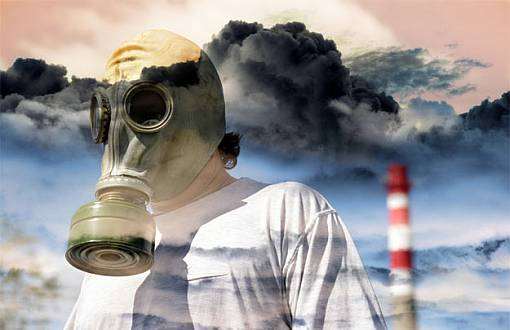The 2.7 million residents of Bursa said farewell to the year 2014 in which for a week they were sent off from the streets because they could not breath. How do I know that? In fact, purely by chance! Unfortunately, as it’s often the case, authorities themselves are often unaware of this, let alone issuing warnings.
It was only after the people of Bursa sent an email to Greenpeace saying that they can’t breathe did the Environment and Urban Planning Department published online figures which showed that the daily average of the particulate matter (PM10) which is known for causing cancer, has exceeded 10 times the daily limit regarded as safe by the World Health Organization.
In fact, in the evening of the 25th December at 6pm just when everyone was heading home from work, the air pollution had reached a level which not even the air quality detector could measure. But nobody did know anything about it. How could they, these particulate matters are even thinner than hair.
The Ministry of Environment warned on their webpage that this poses a risk to our health and that precautions should be taken. That’s all they did, nothing more. Meanwhile, outdoors, everybody, the young, the old, people with Asthma, everybody was breathing in that air. For three days, neither did the governor of that province inform the public on this issue, nor did they call in any meetings to discuss any emergency measures.
It’s already alarming that there are no measures taken against the existing air pollution crisis in Bursa. Yet, it will get worse if DOSAB (Steam and Electricity Generation Plant) is set up in the city centre or if they build the coal thermal power plant in Keles. If these projects are going ahead, then there is no doubt that this will cause even greater health problems.
Everyone in Turkey is breathing the silent killer
But if you do not live in Bursa, you can breathe a little easier. Can you really? According to figures published by the Environment Agency 97.2 per cent of the population living in urban areas in Turkey were exposed to at least 35 days of air pollution above the recommended health limit. In other words, it’s not just the people of Bursa but everywhere in Turkey and throughout the whole year people, not knowingly were breathing these silent killers that are invisible to the naked eye.
You might think, what’s the big deal about breathing, are we not smoking as well? Did ever a young person next to you had an asthma attack? In the village of Yirca in almost one of three children experience breathing difficulties when they go outdoors and in the evenings when they are back home they have sit down with the inhaler and inhale steam. The only reason for this is that they live next to the Soma Thermal Power Plant which in 2010 in Turkey was the second plant that has taken the most lives caused by air pollution.
The World Health Organization has declared air pollution as the cause of 1/8 of deaths worldwide in 2012. Particulate matters (PM 2.5 and PM 10) in the air are breathed in and can lead to illnesses such as respiratory diseases, heart attack, stroke, premature birth, cancer and even premature death.
One of the main causes of particulate matter pollution are coal-fired power plants.
In our Silent Killer report published by Greenpeace, we show that in 2010 in Turkey the coal-fired power plants were twice as much as traffic accidents the cause of death in 2010. You don’t have to be living in a city like Bursa, Afsin, or Zonguldak to be a subject to the silent killer because the particulate matter emerging from the plants chimney (especially PM 2.5) can travel up to a distance of 1,000 kilometers.
This means that basically all of us are unknowingly exposed to the toxic particulate matter coming from the coal-fired power plants or other harming sources. If the current planning of 80 plants are not stopped, these plant will in 40 years’ time cause us to lose at least 1.5 million years of our lives.
How do the Health Ministry fit into this picture?
Turkey is currently aiming to build over 80 new coal-fired power plant stations. This means that besides China, India and Russia, they would pose the world’s fourth most dangerous coal threats. For example, if the planned power plants come to life there will be 14 plants in Çanakkale and including Adana, Mersin and Hatay a total of 25 stations will be powered by coal power plants. As the saying goes step-by-step, this exactly what is going to happen…
So who is approving this? Do the Health Ministry not have something like a smoke-free agenda? Unfortunately the reality is different. As the old chap from Afşin who has been breathing for the last 30 years the ashes that came from the nearby coal-fired power plants said "On orders of the doctor I quit smoking, but what we gonna do about the chimney next to us?
By the end of 2014 plans for 80 new coal-fired power plant have emerged in Turkey. Yet, there is no program to deal with the health effects if the power plants go live.
In fact, according to the 2010-2014 Strategic Plan of the Ministry of Health the number one aim is to protect the community from health risks and to provide an increasingly health and secure physical environment.
While on a daily basis another of the 80 coal-fired power plant is given a pre-licensing, the contribution of the Health Ministry to the EIA reports is to pass it on to the district health authorities and delegate them to make a statement, while remaining silent on health effects of plants. However, the governor of Bursa has not even been able to manage the current air pollution in his district. On the contrary there are rumors that he has pressurized the district health minister to resign because he did not give a positive statement in the EIA report with respect to the planned DOSAB coal-fired power plant in the town on Bursa. This incident has even subject to debates in the parliament. Just this incident on its own demonstrates that having a debate on the effects of the coal-firing power plants on our health parallel to giving permission to these power plants his highly problematic.
So how would you like your air this year? What about the next 40 years? If you say that you would like to breathe comfortably, then stand against Turkey’s growing coal and air pollution threats, and protect the right to public health and the right to breathe clean air. Join us to urge the Ministry of Healthto take immediate action.
Buket Atlı, Greenpeace’s Mediterranean Climate and Energy Campaigns Researcher
* Courtesy of Dilara Acik for the voluntary translation of this article.
* Click here to read the article in Turkish.






